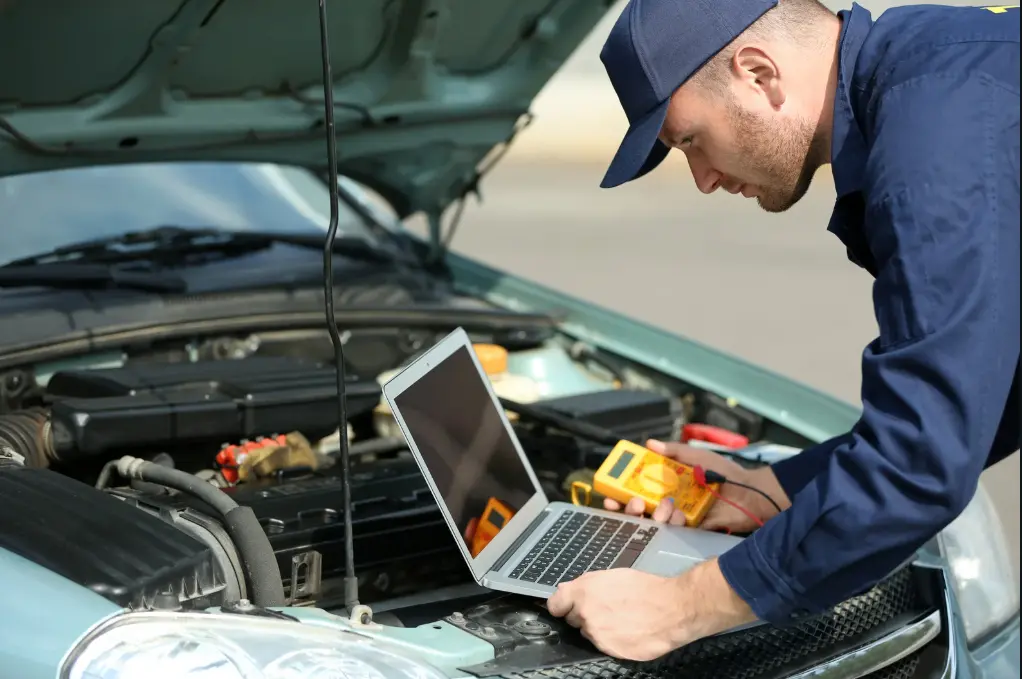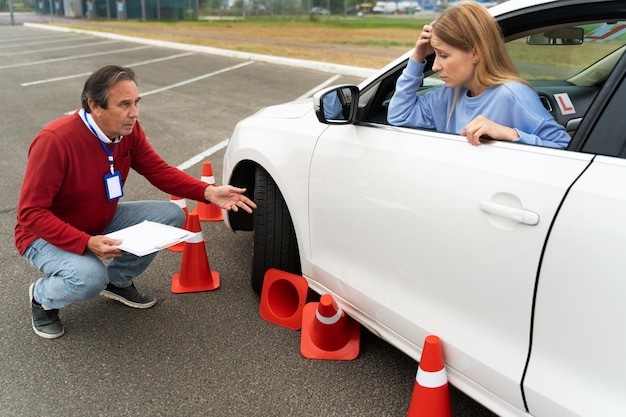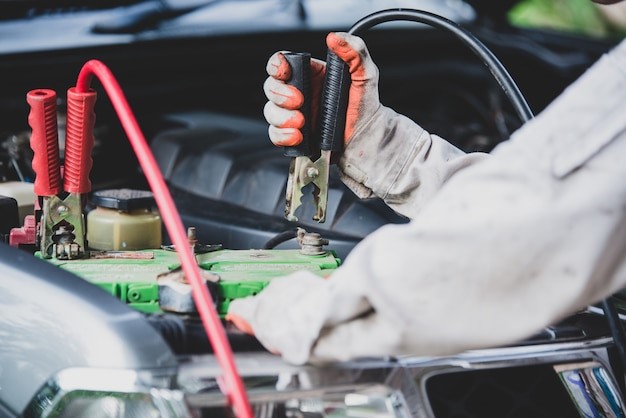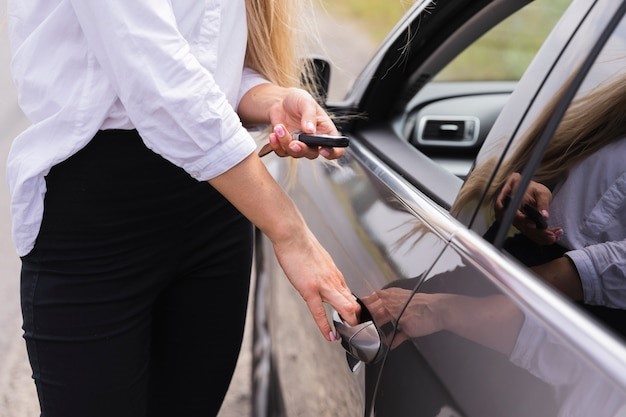The warm weather indicates the season for car trips and family vacations, with windows rolled down and music blaring. However, the heat can also dry out important fluids in your car, causing breakdowns. No one wants to encounter breakdowns in the middle of nowhere. It is both tiresome and stressful. During the summer, the most frequent problems are overheating engines and running out of fuel during long drives.
This guide aims to inform readers about common summer driving problems, offering preventive solutions as well as answering frequently asked questions. We hope this manual enables you to drive without worries throughout the summer.
Most Common Summer Car Repair Issues
In summer, the most dominant symptom of trouble is vehicle overheating. Other systems related to overheating include hot weather “creating or enhancing” leaks, loss of refrigerant, tyre blowouts, and damaged serpentine belts. In summer, hot weather can further aggravate many problems. These are just a few of the systems that contribute to one of the most frequently called roadside assists.
Overheating Engines
Most car overheating issues revolve around the vehicle’s engine cooling system overheating, especially in the summer months. There is burning hot air as well as summertime fuel that adds to the excess heat. During summer, steam is also more visible, and the engine noise increases as the coolant running through the engine blocks boils at higher and higher temperatures.
Typical Causes Might Include:
- Absence of coolant
- Eroded or blocked engines and hoses
- Thermostat input or output failures
- The radiator fan does not function
- The radiator is blocked, preventing coolant circulation.
Here are the Warning Signs:
- The temperature gauge on the dashboard is overheating.
- Steam is venting from the bonnet.
- The sweet scent indicates a coolant leak.
- Reduced engine performance.
Here are the following prevention suggestions:
- Make certain proper coolant levels are maintained.
- Replace broken belts and hoses.
- Cooling systems should be flushed out after 30,000 to 50,000 miles
- After parking the vehicle, check for puddles of coolant below the vehicle.

Imagine driving up a steep hill while running the air conditioner at maximum settings. Your engine will be constantly overworked, and the circulation of coolant will be diminished, leading to overheating. Now think about being forced to pull over because the system overheating triggers safety measures.
Tire Blowouts
Taking these aspects into consideration, the summer heat can be relentless, especially when driving on the motorways, which puts you in these conditions. Whenever the road is boiling and you are heavily loaded, you will be travelling at top speeds. This is also going to deflate your tyres.
Typical Causes Might Include:
- The air in your tires gets voluminous due to heat.
- Sidewalls stretch more, resulting in heat due to low pressure.
- Worn-out old tires have higher chances of failure.
Here are the following warning signs:
- Obvious effects in the sidewall of bulges or cracks.
- The knocking or vibrations.
- Tires that appear visibly underinflated.
Here are the following prevention suggestions:
- Check each tyre pressure once a month and do so when tyres are cool for the best results.
- Check the tread depth and replace the tyres if below the two-thirty-second mark.
- Do not exceed the weight limit of the vehicle.
- Rotate the wheels after 5,000 to 7,500 miles of distance.
Consider the scenario where you are driving for hours to visit family, and the sun overheats the tarmac. Now picture your car pulling to one side in a sharp motion, coupled with a loud pop. That is the classic summer blowout.
Dead or Weak Batteries
While it is commonplace to associate the winter season with battery problems, summer poses its own set of challenges. High temperatures often worsen existing corrosion while simultaneously causing electrolyte fluid to evaporate, leading to dead batteries.
Typical Causes Might Include:
- Excessive heat in both the outdoors and the indoors of a car’s cabin increases the rate of chemical reactions taking place in the battery.
- In this case, the fluid level is reduced from elevation, which would deem the car incapable of performing tasks.
- Terminals and connections also get corroded over time and build up bumps, which results in this issue.
Here are the following warning signs:
- Turn the key, and you will be greeted with a slow crank.
- The ignition will make clicking noises when trying to start.
- The lights on the dashboard will have a flickering pattern.
Here are the following prevention suggestions:
- Schedule a battery check before going on summer trips.
- Clean the terminals and use protective spray on them.
- Do not park in direct sunlight.
- Replace batteries older than 3-5 years.
Picture yourself parking your car on the beach for an entire day. At the end of the day, you come back only to find that your car refuses to start.
Malfunctions of the Cooling and Heating Systems
Driving in 95-degree weather without air conditioning is unbearably hot. For this reason, summertime tends to be the busiest season for air conditioning repairs due to their overuse.
Typical Causes Might Include:
- Cooling efficiency loss from refrigerant leaks.
- Worn-out compressors.
- Dirty condensers.
Here are the following warning signs:
- Weak airflow.
- Noisy operation.
- AC musty odor.
The air conditioning system works well in spring, but during summer, it progressively worsens until mid-July, when it only blows warm air. This is a sign of a refrigerant leak or a failing compressor.
Here are the following prevention suggestions:
- Service AC during off-peak winter months.
- Scheduled general maintenance includes yearly inspection for all.
- Change the cabin air filter regularly.
Brake Issues
Drivers must endure the most excruciating driving circumstances in stop-and-go traffic or hilly areas during the summer. This combination of stop-and-go driving along with steep hills creates fierce brakes, and when roads are hot, even more so. Overheating could lead to excessive wear and tear on the braking pads, accompanied by boiling brake fluid.
Reasons for this Include:
- Increased evaporation of moisture during hot weather leads to surplus heating.
- Moisture contamination of brake fluid yields a lower boiling point fluid.
- Brake pads becoming case-hardened leads to friction reduction.
Here are the following warning signs:
- A spongy brake pedal is experienced by the driver.
- Sluggish response upon brake actuation.
- Reduction of speed when ceasing forward motion.
Here are the following prevention suggestions:
- Replace brake fluid every two to three years.
- Perform regular inspections on the pads and rotors.
- Instead of riding brakes while descending, downshift in order to control speed to reduce brake usage.
Hearing squeaks while pressing the brakes can serve as an alert for overheating brakes and worn brake components. In these scenarios, a driver would be experiencing the sensation of needing to decelerate while moving through city traffic, particularly in the summer heat.
Locked Keys in Hot Vehicles
Although not classified as a mechanical failure, a great number of individuals tend to lock their keys inside during attempts at escaping the sweltering heat or in busy areas such as beaches. The attempt to escape overwhelming temperatures can lead to irritating oversights.
Typical Causes Might Include:
- Heat-induced distraction.
- Automatic locking systems associated with garage doors limit the driver’s ability to access the vehicle without the key.
Here are the following warning signs:
- In hot weather, a vehicle interior can reach lethal temperatures within minutes.
- Pets, the elderly, children, and those with chronic health conditions are at the greatest risk.
Here are the following prevention suggestions:
- Always double-check that you have all your belongings before exiting the vehicle and closing the door.
- Spare keys can be stored in magnetic boxes placed under the vehicle.
- Smart unlocking systems that allow Immediate vehicle access through mobile applications are recommended.
Summer Car Maintenance Tips to Prevent Breakdowns
Less prominent maintenance shocks are also capable of saving one hour of waiting for a tow. The summer is an excellent time to:
Level verification:
Make monthly checks for engine oil, coolant, brake fluids, power steering fluid, and even windscreen washer fluid.
Inspect Belts and Hoses:
Focus on small and big hoses for cracks, leaks, or soft worn areas.
Battery Test:
This entails the cleaning of closed battery terminals and the securing of corrosion.
Inspect Tire Condition and Pressure:
Ensure proper inflation to the recommended PSI and even wear.
Conclusion
The summer season provides an endless opportunity for exploration and travel, but it comes with the added concern of car problems such as overheating the engine, losing tyres, weak batteries, failing air conditioning, and brake problems. All of these issues can transform an enjoyable journey into a bad trip. Adopting proactive approaches such as scheduled servicing, equipping the vehicle with an emergency kit, and paying attention to early warning signals can significantly reduce the likelihood of encountering a breakdown.
No matter how well you prepare, there is always the possibility of facing unforeseen problems that require dependable solutions. All 4 One Transportation Service is here to help. Our dedicated team is ready 24/7 to assist with jump starts, tyre changes, lockout help, towing, and more in Allenhurst, GA, and surrounding areas. We’re committed to helping you get back on the road quickly and safely.
FAQs
Engines typically work best in the 195 – 220°F range. If an engine is operating at 240°F or more, it poses a significant danger and needs to be shut off immediately to prevent damage.
At least once a month, but ideally every two weeks. Check it when the tires are cold in the morning to get an accurate reading.
Reasons may be low refrigerant level, dirt blocking the condenser, or a tired and constantly working compressor, which may be overheating and drawing too much power.




